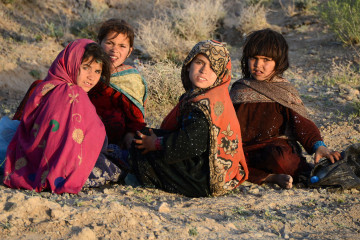

Rahima*, 17, was top of her class and loved going to school before her parents were forced to arrange her engagement to an older man.
The family were desperate for money as they were surviving on bread and rarely ate a proper meal. Her mother, Marzia*, had already lost five babies in the past because they couldn’t afford healthcare, so she was determined that her other children would survive.
Shortly after the engagement, Rahima dropped out of school and stopped talking to her family and friends.
“Before the engagement, she was completely well, she did all her tasks well and was interested in life. After the engagement, everything changed… she became disengaged in life and school and argued with her siblings. When I used to ask her about school, she would hit her head on the wall continuously and then she would get a headache,” the young girl's mother reveals.
Rahima is among the scores of children in Afghanistan struggling with their mental health, as a leading children's charity warns that the country is on the brink of a mental health catastrophe.
The economic crisis and decades of conflict have taken a dangerous toll on children’s mental and psychosocial well-being, Save the Children has said, adding that only one in four children and adults are receiving the treatment they urgently need, while many may not recover and will face long-term consequences.
Children are under increasing emotional and psychological pressure as they bear the brunt of the worsening crisis in Afghanistan. Many go to bed hungry night after night, drop out of school to work to support their family, have lost loved ones due to a lack of healthcare and have very little hope for the future.
There are an estimated 4,460,000 children and adults who need mental health and psychosocial support in Afghanistan, but so far this year, only 1,308,661 people have been able to access services and treatment, according to new data from Save the Children.
"Many children go to bed hungry night after night, drop out of school to work to support their family, have lost loved ones due to a lack of healthcare and have very little hope for the future"
A recent Save the Children report also found that one in four girls showed signs of depression or anxiety and that two-thirds of children said they felt negative feelings – including feeling more worried, sad and angry.
Parents have told Save the Children that, due to the violence and the current financial pressures on their families, they have seen concerning changes in their children’s behaviour, including uncontrollable crying, nightmares, aggressiveness and self-harm.
The majority of children and adults who need psychosocial support services cannot access them because the services don’t exist in their communities. Afghanistan’s healthcare and child protection systems have long been under-resourced, and facilities often lack qualified staff and resources. Families also struggle to pay for treatment and for transport to and from facilities.
New restrictions imposed by the Taliban have also had an impact on children’s mental health, especially for girls. The restrictions mean many girls have been excluded from school, socialising and going to parks and shops. The economic crisis has also forced some girls into early marriage as their parents need the money to feed the other children in the family.
Rasheeda, a Save the Children counsellor, said Rahima used to cry continuously and hit herself. She provided psychosocial support to Rahima and helped encourage her to go back to school. Rasheeda also negotiated with the families to delay the marriage until Rahima is an adult and has finished school.
“The current crisis in Afghanistan is pushing children to their absolute mental and emotional limits," said Nora Hassanien, Acting Save the Children Country Director in Afghanistan. "What these children are experiencing – the bombings, watching as their siblings die from hunger, being banned from school and separated from their parents – is having a fundamental impact on their mental and psychosocial wellbeing.
*Names changed to protect identities




 Follow the Middle East's top stories in English at The New Arab on Google News
Follow the Middle East's top stories in English at The New Arab on Google News


